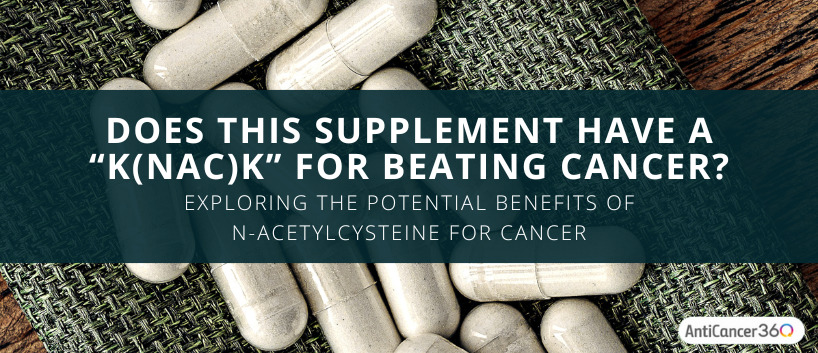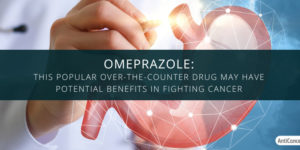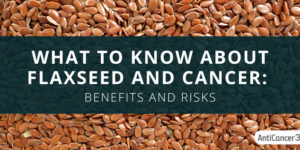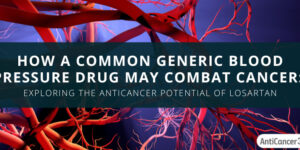Medical Disclaimer: The information in this article is meant for educational purposes only. It is not intended to replace a healthcare provider’s medical advice, diagnosis, or treatment. Consult a healthcare practitioner before taking any new medications or dietary supplements.
When it comes to fighting cancer, people are always looking for more effective and safer treatments. By leveraging popular integrative approaches that involve adding natural substances (supplements), honing your nutrition while limiting sugar intake, and utilizing certain “off-label” medications for potential anticancer benefits, we believe that using a variety of approaches can make a difference. Anticancer 360 can help provide support and guidance for individuals fighting cancer, offering additional ways to strengthen their battle alongside oncology treatments.
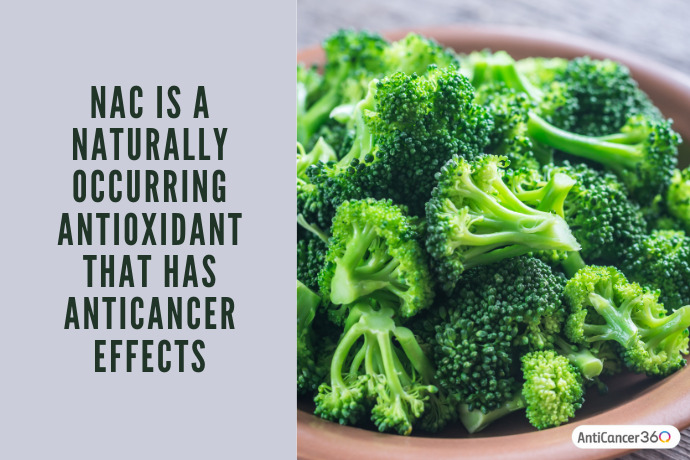
One supplement that has gained attention in recent years is N-acetylcysteine (NAC). Some believe that NAC might hold the key to beating cancer. But what exactly is NAC and is there any truth to these claims? New research suggests that NAC, a naturally occurring antioxidant, has anticancer effects. In this article, we will explore the potential of NAC in cancer treatment and discuss how it might work.
What is NAC?
Cysteine is an amino acid found in certain foods such as broccoli, eggs, dairy products, garlic, legumes, and other plant sources. NAC is an antioxidant supplement, available in powder or capsule form, derived from cysteine. It has numerous health benefits, including improving respiratory health and helping to detoxify the body. It has been used as a supplement for many years to treat conditions like asthma and colds [1].
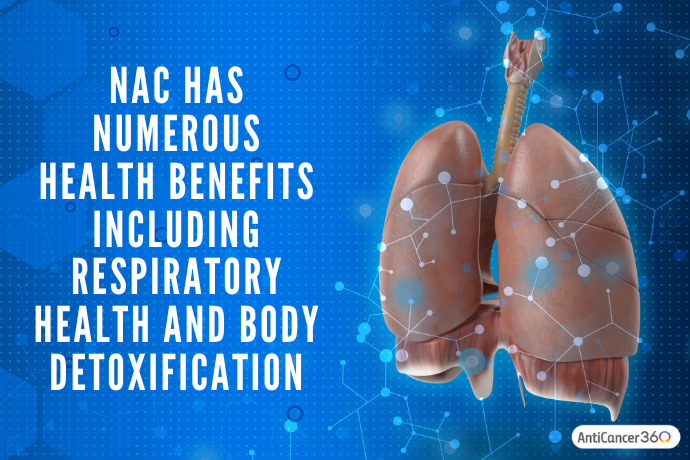
NAC is also available as a prescription drug, used to treat various medical conditions such as Tylenol toxicity, liver disease, heavy metal toxicity, cystic fibrosis, and bronchopulmonary disease. In prescription form, NAC comes as an inhalation solution, intravenous solution, oral capsule, oral solution, and oral tablet [2]. Recently, it has been studied for its potential use in treating cancer due to its ability to prevent tumor growth and promote the death of cancer cells [3].
The potential of NAC lies in its ability to scavenge free radicals in the body. Free radicals are unstable molecules that can damage cells and lead to the development of cancer. By neutralizing these molecules, NAC may help reduce the risk of cancer by way of reducing oxidative stress and inflammation. This scavenging also protects healthy cells against DNA damage caused by chemotherapy drugs [4].
The exact way that NAC works against cancer is still unclear, but it is thought to be related to its antioxidant properties. NAC boosts levels of glutathione, an antioxidant produced naturally by the body. Glutathione helps protect cells from damage caused by free radicals. NAC may also reduce oxidative stress in cancer cells. Oxidative stress is a type of cellular damage caused by free radicals that can cause mutations in DNA and lead to cancer growth. By reducing oxidative stress, NAC may prevent these mutations and limit the number of cancer cells that can form [5].
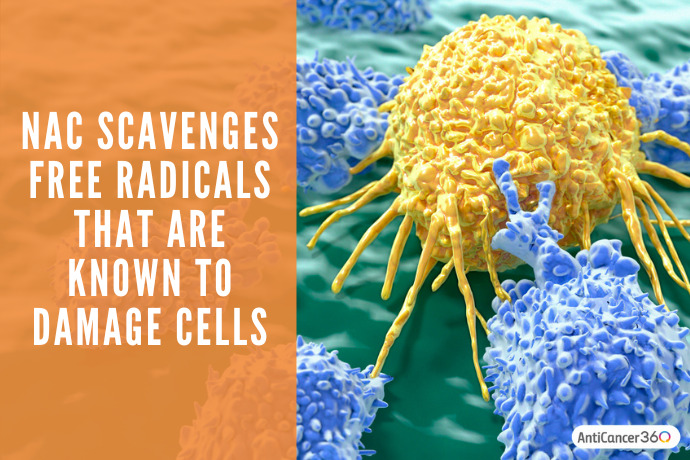
Studies have shown that NAC may be effective in preventing and treating certain types of cancer, including bladder, breast, colorectal, prostate, and ovarian cancer. It has also been suggested that it may have the potential for the prevention and treatment of lung cancer [6]. Additionally, it may also help to reduce some of the side effects of cancer treatments such as chemotherapy, radiation therapy, and immunotherapy [7],[8].
NAC: Glutathione, Reactive Oxygen Species (ROS), and Therapeutic Potential
Recently, research has suggested that NAC may have beneficial effects on certain types of cancer, including triple-negative breast cancer (TNBC). TNBC is a type of breast cancer that is more aggressive and difficult to treat than other types of breast cancer. It does not respond to hormones or drugs like other forms and is associated with a poorer prognosis [9]. TNBC is characterized by the lack of receptors for estrogen, progesterone, and human epidermal growth factor receptor 2 [10].
One of the key factors in the progression of TNBC is the critical role that reactive oxygen species (ROS) play in its survival and malignancy. ROS are molecules that contain oxygen and have the potential to react with other molecules in the body. Compared to normal cells, TNBC cells are highly dependent on ROS. TNBC cells lack a protein called estrogen receptor, which regulates many cellular processes. Without this protein, TNBC cells experience increased levels of ROS. High ROS production promotes cancer cell survival and growth in TNBC. The aggressive nature of TNBC is also attributed to high ROS concentrations because of the ROS activated signaling pathways that put cancer cell proliferation and migration into overdrive. One way to reduce the levels of ROS within these TNBC cells is by using NAC [11]. The decrease in ROS-mediated signaling among cancer cells affects their resistance to drugs, survival, and ability to spread.
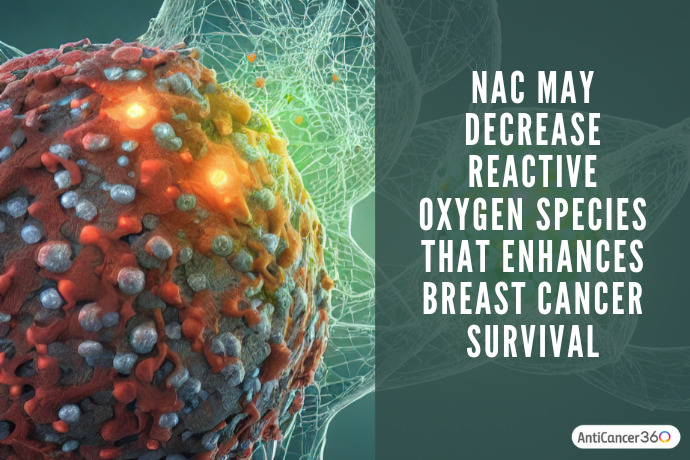
The tumor microenvironment plays an important role in the development and progression of cancer including chemotherapy resistance. It consists of a complex mixture of cells that contribute to tumor development. The interactions within the microenvironment are regulated by ROS, which, as stated earlier, can either stimulate or inhibit cancer cell proliferation, migration, and metastasis [12].
Studies have shown that NAC can modulate ROS levels in the tumor microenvironment, which often become elevated due to tumor cell metabolism and inflammation. NAC also has anti-inflammatory properties, which could help reduce the growth of tumor cells and prevent metastasis [13]. In addition, NAC has been shown to increase the sensitivity of tumors to chemotherapy drugs, making them more effective against cancer.
While NAC shows promise as a potential adjunct therapy in cancer treatment, further research is needed to establish its effectiveness. Cancer treatment should always be approached with a comprehensive and evidence-based strategy, involving the guidance of healthcare professionals. Consult with a healthcare professional before considering the use of NAC or any other supplement while receiving cancer treatment.
Frequently Asked Questions About NAC
Where can I buy NAC?
NAC is available as an over-the-counter supplement that can be purchased at most health food stores, nutrition stores, and some pharmacies [14]. It is also available online from various retailers. Some forms of NAC are also available by prescription [15].
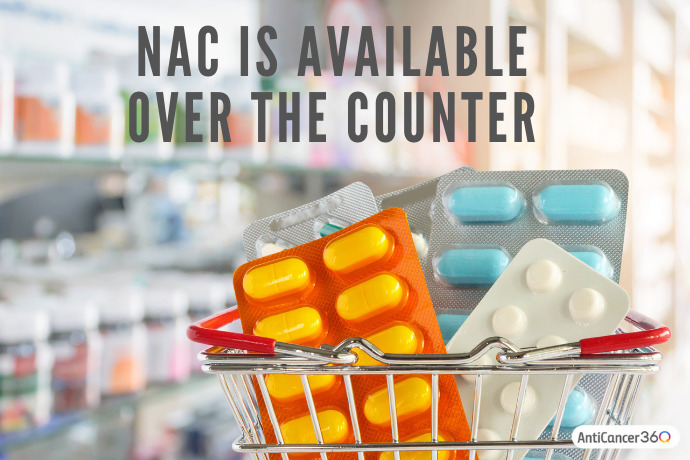
Are there side effects to taking NAC?
It’s important to mention that NAC can cause side effects. Common side effects include gastrointestinal symptoms such as nausea, vomiting, and diarrhea. In rare cases, it can cause severe allergic reactions or worsen existing respiratory conditions like asthma.
Is it OK to take NAC every day?
It is generally safe to take NAC (NAC) every day, in recommended dosages. NAC is a powerful antioxidant that has been shown to offer numerous health benefits, including supporting healthy immune function and protecting cells from oxidative stress.
Who should avoid NAC?
People taking certain medications should not take NAC without consulting their doctor first. Those taking anticoagulants such as warfarin, aspirin, clopidogrel, or heparin should probably avoid NAC due to an increased risk of bleeding from the combination.
In addition, NAC may interact with other medications, such as nitroglycerin. Nitroglycerin is a medication commonly used to treat chest pain. It works by lowering the heart rate and relaxing the blood vessels. While it can be beneficial in treating chest pain, its use carries potential risks that should not be taken lightly. For example, nitroglycerin may cause adverse effects of low blood pressure, dizziness, fainting, headache, and other side effects. As a result, taking nitroglycerin with NAC can further reduce blood pressure and cause severe headaches. Therefore, it is essential to consult with a healthcare professional first to determine whether this combination is safe for you [16].
What other potential benefits does NAC have?
NAC is a powerful antioxidant and anti-inflammatory agent recommended by many practitioners for its potential to protect against cell damage. In addition to this, studies have indicated that this supplement may offer protection from damage to the lungs and kidneys as well which can be beneficial in cancer patients who are already at risk of such injuries due to their treatments. Early research suggests that NAC may also discourage metastases in breast cancer stem cells providing additional protection in addition to what chemotherapeutic agents might do.
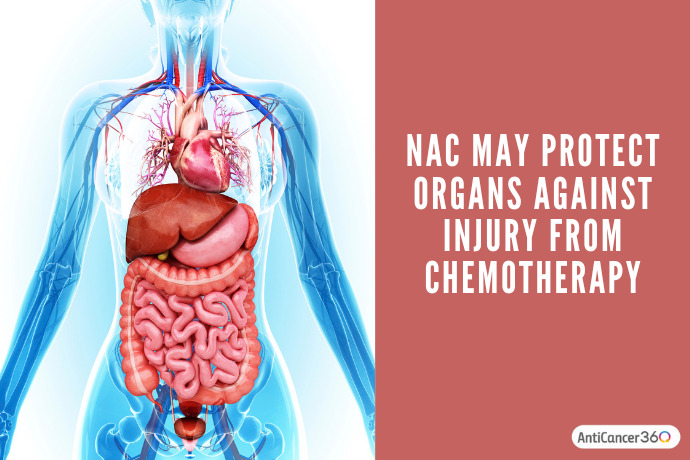
Additionally, there has been some anecdotal evidence that NAC might help increase hemoglobin levels; however, there have been no studies demonstrating this in cancer patients.
Are You A Good Candidate For AntiCancer360?
Overall, you can see that there can be many potential benefits to adding an NAC supplement…and when you’re fighting cancer, you want to take full advantage of every possible anticancer strategy, including a healthy diet and beneficial supplements.
People are always searching for better cancer treatments. The good news is there are things you can do to strengthen your battle with cancer. You don’t have to fight alone. Anticancer 360 is here to help. We can guide you through the anticancer world so you can make informed decisions. By using integrative approaches, like adding natural supplements and improving your nutrition, we believe we can make a difference in your care.
Ultimately, when using an Aggressive Integrative Approach to cancer, the goal is to fight cancer from every possible direction. This practice includes integrating repurposed medications and natural supplements to fight cancer in an evidence-based, safe way that shouldn’t interfere with your oncology treatment.
How are you approaching your cancer treatment? Are you integrating any natural supplements or strategic dietary approaches? Have you tried NAC or any other off-label medicines for your cancer? Please feel free to share your experience or feedback in the comments below!
If you’d like to learn more about the AntiCancer360 approach and see if we can help you, please watch our free online webinar to learn more. At the end, you’ll be able to schedule a free call with our team so that we can discuss your case in detail.
Dr. Andrew Cox is a graduate of the University of Pittsburgh and is part of the AntiCancer360 team as a consultant pharmacist and medical writer. He received his Bachelor’s degree in Biology from Marist College and a Master of Arts in Cell Biology from Villanova University prior to completing his Doctor of Pharmacy at Pitt. He also completed his Masters of Business Administration from the University of Maine. His expertise helps us create safe herbal and supplement combinations and avoid potential drug interactions.
Andrew has been a licensed pharmacist since 2013 with experience in outpatient retail pharmacy, long term acute care, and managed care pharmacy. He is interested in the appropriate utilization of natural substances to effectively prevent and treat cancer in addition to the traditional treatment strategies. He is also interested in the research and the latest findings of the mechanisms by which various natural compounds affect the tumor microenvironment
In his free time, Andrew enjoys traveling, reading, and the Premier League games on the weekends. He resides in Pittsburgh, Pennsylvania with his wife, daughter, and a boxer mix named, Party Martie.

